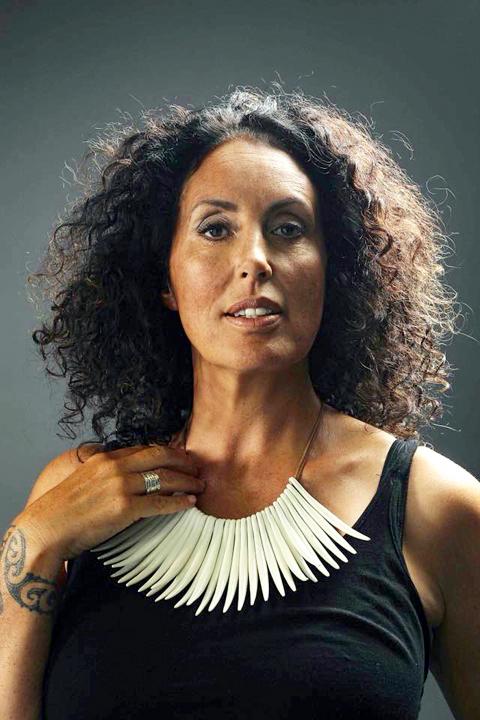A collaboration between indigenous musicians from New Zealand and Taiwan will be presented to the public for the first time on Sunday as part of a concert and charity auction at Kuangchi Public Service (光啟社), a Catholic media production company.
Maori singer Moana Maniapoto chose Taiwan as one of six countries for her upcoming album project, Ono 6, which aims to showcase the voices, languages and cultures of their Aboriginal peoples. This will be the fourth time she has performed in Taiwan and she hopes to further celebrate the Austronesian links between her people and Taiwanese Aborigines.
Moana is in the mountains of Hsinchu County today working on the song with Aboriginal Atayal singer Inka Mbing, titled Kay Maku + Toku Reo, which means “my language” in Atayal and Maori, respectively. They will record it on site for the album.

Photo courtesy of Moana Maniapoto
Sunday’s show will also include New Zealand electronic musician Paddy Free as well as a lubuw, an Atayal mouth harp performance. The auction is for Father Barry Martinson’s stained glass paintings, which have allowed him to build a youth center for the Aboriginal community of Chingchuan (清泉), as well as spearhead a street restoration and beautification project.
■ 5/X Art Space, 20, Ln 233, Sec 1, Dunhua S Rd, Taipei City (敦化南路一段233巷20號)
■ Admission is free; Sunday at 2pm

June 9 to June 15 A photo of two men riding trendy high-wheel Penny-Farthing bicycles past a Qing Dynasty gate aptly captures the essence of Taipei in 1897 — a newly colonized city on the cusp of great change. The Japanese began making significant modifications to the cityscape in 1899, tearing down Qing-era structures, widening boulevards and installing Western-style infrastructure and buildings. The photographer, Minosuke Imamura, only spent a year in Taiwan as a cartographer for the governor-general’s office, but he left behind a treasure trove of 130 images showing life at the onset of Japanese rule, spanning July 1897 to

One of the most important gripes that Taiwanese have about the Democratic Progressive Party (DPP) is that it has failed to deliver concretely on higher wages, housing prices and other bread-and-butter issues. The parallel complaint is that the DPP cares only about glamor issues, such as removing markers of Chinese Nationalist Party (KMT) colonialism by renaming them, or what the KMT codes as “de-Sinification.” Once again, as a critical election looms, the DPP is presenting evidence for that charge. The KMT was quick to jump on the recent proposal of the Ministry of the Interior (MOI) to rename roads that symbolize

On the evening of June 1, Control Yuan Secretary-General Lee Chun-yi (李俊俋) apologized and resigned in disgrace. His crime was instructing his driver to use a Control Yuan vehicle to transport his dog to a pet grooming salon. The Control Yuan is the government branch that investigates, audits and impeaches government officials for, among other things, misuse of government funds, so his misuse of a government vehicle was highly inappropriate. If this story were told to anyone living in the golden era of swaggering gangsters, flashy nouveau riche businessmen, and corrupt “black gold” politics of the 1980s and 1990s, they would have laughed.

In an interview posted online by United Daily News (UDN) on May 26, current Chinese Nationalist Party (KMT) Chairman Eric Chu (朱立倫) was asked about Taichung Mayor Lu Shiow-yen (盧秀燕) replacing him as party chair. Though not yet officially running, by the customs of Taiwan politics, Lu has been signalling she is both running for party chair and to be the party’s 2028 presidential candidate. She told an international media outlet that she was considering a run. She also gave a speech in Keelung on national priorities and foreign affairs. For details, see the May 23 edition of this column,